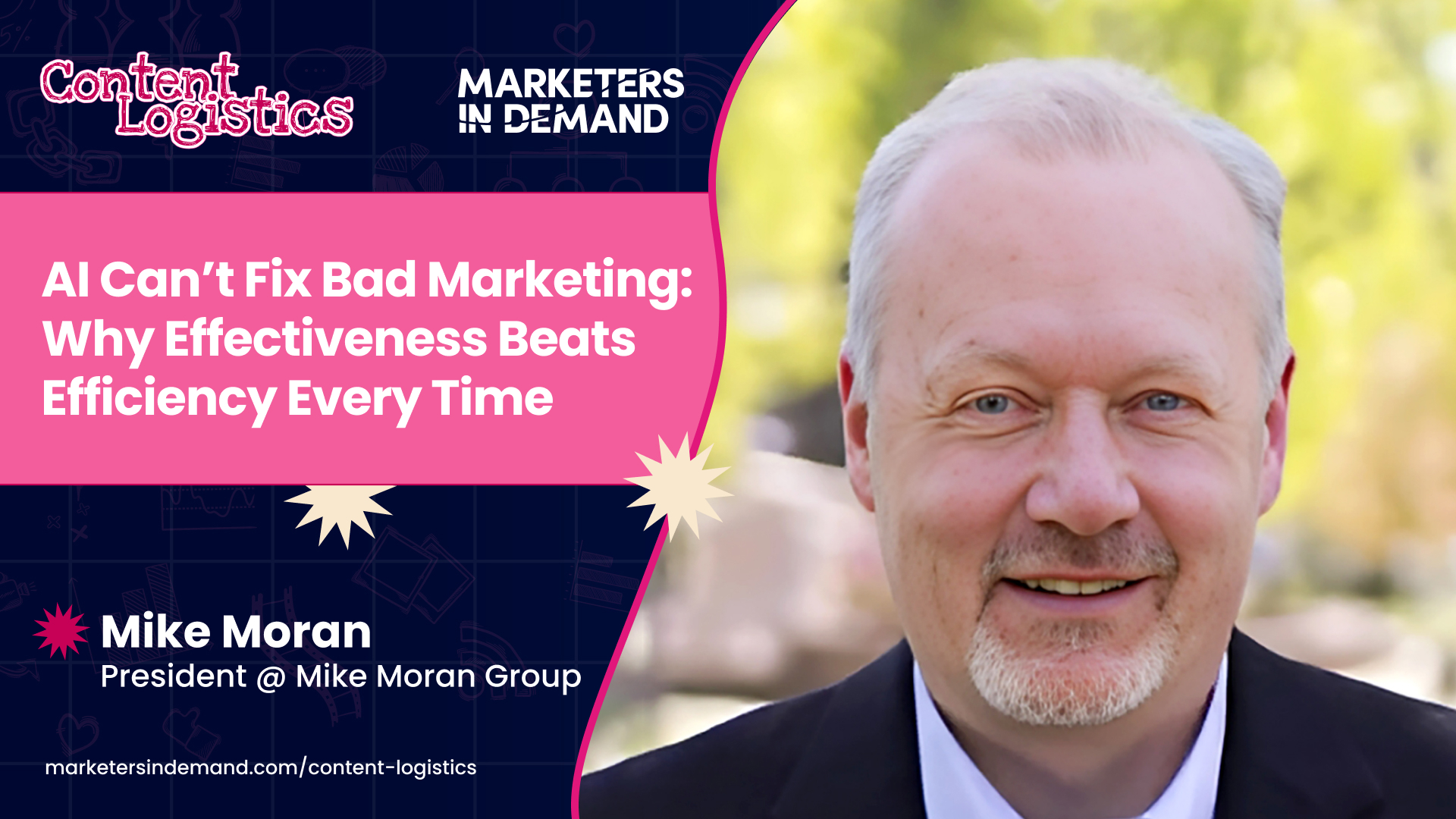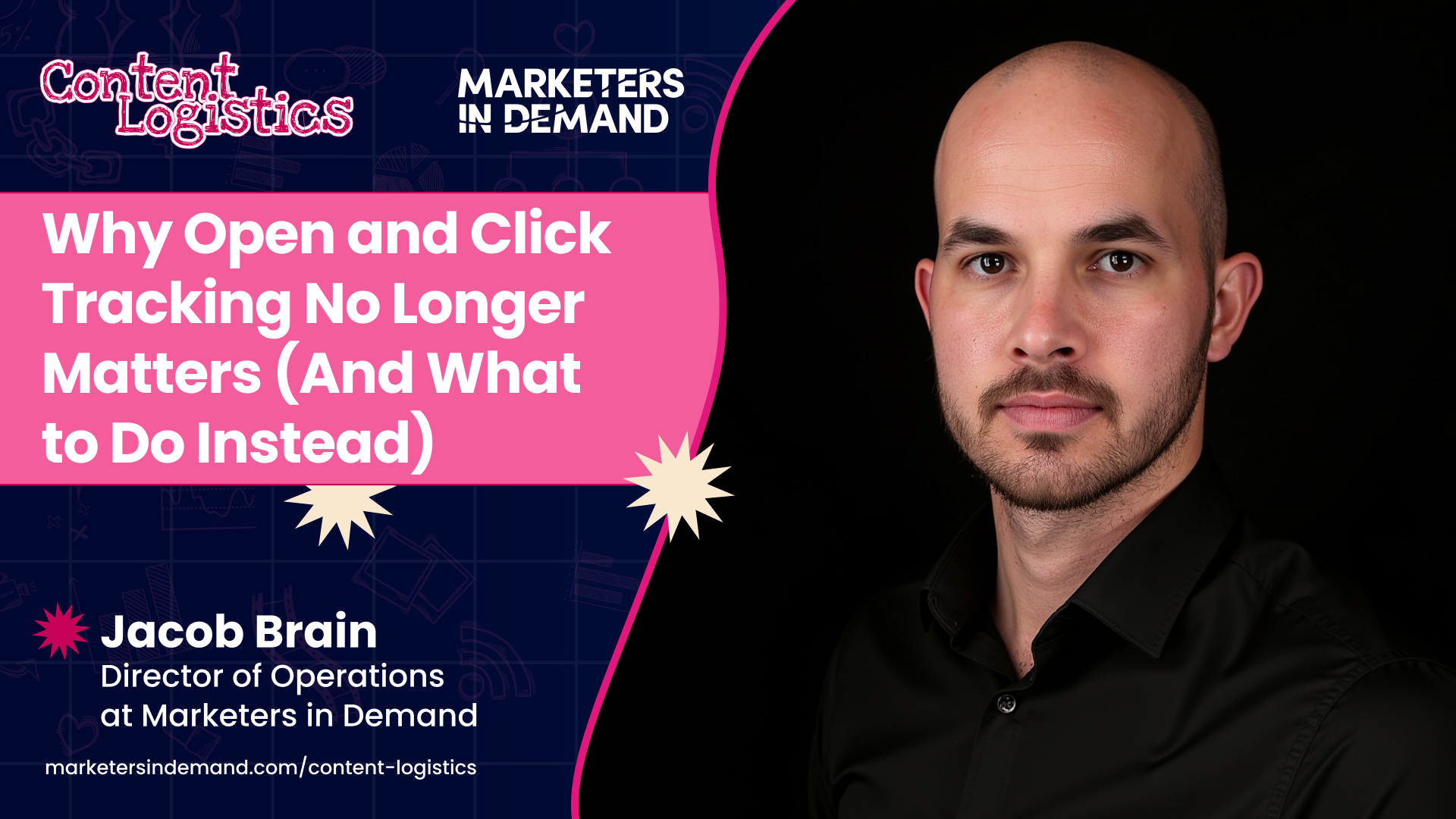Search engine optimization has long been anchored to rank tracking, a methodical approach to monitoring keyword positions, optimizing for higher rankings, and using data to demonstrate marketing success. However, Google’s recent algorithm updates have fundamentally disrupted traditional tracking tools, creating significant challenges for marketers seeking to measure search positions with their previous level of precision.
In this episode of Content Logistics, host Baylee Gunnell engages in an in-depth conversation with Colin Costigan, Account Director at Marketers in Demand. Together, they dissect the evolving landscape of SEO, exploring how AI-driven search behavior, zero-click searches, and Google’s dynamic ranking factors reshape digital marketing strategies.
Colin explains how Google’s commitment to enhancing user experiences and transitioning toward AI-generated overviews have deprioritized traditional rank positions. Instead, the focus has shifted to engagement-driven metrics. He delves deep into the E-E-A-T framework—Experience, Expertise, Authoritativeness, and Trustworthiness—offering strategic guidance on how businesses can optimize content for sustained visibility.
Moving beyond the outdated approach of chasing rankings, Colin advocates for a more holistic strategy. He encourages marketers to concentrate on metrics that drive business growth, such as share of voice, user engagement, and conversion rates. The conversation extends to exploring the growing significance of video, images, and social signals in search rankings, providing listeners with a comprehensive understanding of modern SEO strategies.
Featured Guest

Name: Colin Costigan
What he does: Account Director
Company: Marketers in Demand
Noteworthy: Expert in SEO strategy, digital marketing measurement, and search engine algorithm updates.
Featured Guest
Key Insights
Why Traditional Rank Tracking is Becoming Obsolete
Google has implemented fundamental changes in content ranking. Recent updates—including JavaScript search requirements, AI-generated overviews, and an increased emphasis on user engagement signals—have conclusively demonstrated that rank position alone is an insufficient measure of SEO success.
Despite that, many marketers remain fixated on achieving the top search result position, an approach that Colin argues is increasingly obsolete. Contemporary search behavior reveals that users frequently scroll past top-ranking results, disregard sponsored links, and increasingly rely on AI-powered search tools like ChatGPT.
The strategic objective has evolved from merely ranking high to establishing a meaningful presence where the target audience actually discovers and consumes content. This might encompass visibility across multiple platforms—Google, LinkedIn, YouTube, and beyond.
Businesses are already witnessing lead generation directly through ChatGPT recommendations. While measuring these interactions differs significantly from traditional SEO methodologies, the imperative is clear: companies must adapt by creating content that is accessible, authoritative, and structured in ways that AI tools can readily interpret and surface.
The Importance of E-E-A-T in Today’s SEO Strategy
Google’s ranking algorithms increasingly prioritize content demonstrating Experience, Expertise, Authoritativeness, and Trustworthiness (E-E-A-T). Websites producing low-value, AI-generated content lacking substantive insights are experiencing diminished visibility, while those establishing genuine subject matter expertise are ascending in search rankings.
Colin illustrates this shift by referencing how prominent companies like HubSpot have faced penalties for publishing content outside their core competencies. The emphasis has transformed from technical optimization to creating comprehensive, meticulously researched content. This involves securing authoritative backlinks, continuously updating material to reflect industry developments, and conclusively proving that your content represents the most reliable resource for your audience.
Why Marketers Need to Rethink SEO Metrics
As traditional rank tracking becomes increasingly unreliable, marketers must develop more sophisticated performance measurement strategies. Colin introduces alternative SEO metrics that provide a more nuanced performance assessment. Organic traffic growth, engagement rates, and conversion metrics have become more meaningful impact indicators than simplistic rank positioning.
Share of voice has become a particularly valuable metric—measuring a brand’s visibility across search engines, social media, and industry platforms. A site might not rank first for a specific keyword but could still attract substantial search traffic through AI recommendations, featured snippets, or alternative discovery methods.
Colin emphasizes that SEO’s ultimate purpose extends beyond traffic generation to visitor conversion. Engagement metrics such as page time, content interactions, and click-through rates to additional resources offer far more profound insights into content effectiveness than traditional keyword rankings.
The Role of Video and Images in Search Rankings
Google is progressively prioritizing multimedia content, positioning video and original images as essential to effective SEO strategies. Businesses are encouraged to move beyond generic stock imagery, instead investing in original content, explainer videos, and visually compelling assets that enhance user engagement and increase the likelihood of appearing in Google’s image and video search results.
By strategically integrating multimedia elements into blog content, companies can improve visibility and create more dynamic, engaging user experiences. Optimization of video descriptions, alt text, and metadata provides additional opportunities to enhance search performance.
Episode Highlights
The Technical Shift That Broke Rank Tracking
Timestamp: [00:08:24]
Colin provides a detailed exploration of how Google’s JavaScript search requirements have fundamentally altered rank-tracking capabilities. Many marketers experienced sudden ranking disappearances, which resulted from tracking systems failing to adapt to Google’s evolving search behavior analysis methods.
“Google recently started requiring JavaScript to be utilized on a search, and that was really to limit the use of bots and the bot traffic that was inflating results… Now with the tools that a lot of people in this space use, like Ahrefs or SEMrush, they had to sort of pivot their approach on how they’re crawling a website.”
How Search Behavior is Shifting Beyond Google
Timestamp: [00:04:12]
The conversation explores the expanding search ecosystem, highlighting how platforms like ChatGPT, LinkedIn, and YouTube are emerging as significant search destinations. Marketers must reimagine their content distribution strategies as users increasingly turn to AI-generated responses and social discovery mechanisms.
“Google isn’t the only thing that people are searching on. A lot of that has to do with ChatGPT now introducing their own search browser or even Google’s aspect of utilizing AI overviews that you can find at the top of a lot of those searches… People are finding your site from all of these other places, but they don’t need to dive into these things because they’re getting a summary of what they’re looking for without actually having to visit your website.”
The Case for Measuring Engagement Instead of Rank
Timestamp: [00:13:54]
SEO success is reframed as a holistic concept focused on creating content that genuinely engages and converts rather than simply achieving top rankings. Colin advocates for a more comprehensive approach to measuring marketing impact.
“It’s not necessarily important that you rank number five for this instead of number one, because you’re still getting a good share of that traffic… Are people engaged? What’s the engagement rate or time of engagement that people are on these pages? Are they sitting there and doing nothing or are they actually scrolling through the pages, clicking through to other resources? That’s a good indicator to Google that your resource is actually helpful.”
Why Timely, Industry-Relevant Content Wins in Search
Timestamp: [00:27:44]
The episode underscores the critical importance of publishing fresh, timely content. By leveraging industry trends, algorithm updates, and breaking news, businesses can capture more search traffic and drive meaningful engagement.
“Timely content is always going to have value… When news breaks, whether it’s from politics or changes in systems or changes in policies, there’s always going to be an influx of traffic to keywords that are relevant to that topic. You want to release timely content that speaks to it… If you miss out even for a week or a month, you may have missed the gap or the influx of search that is going on.”











